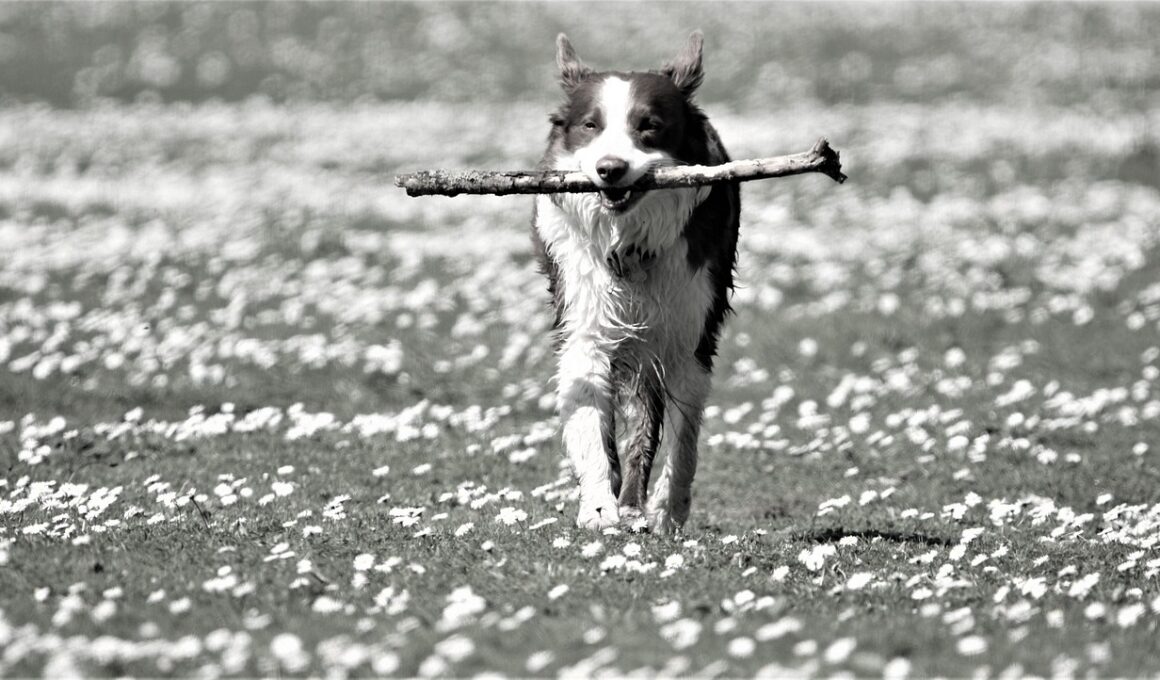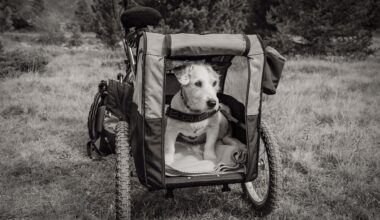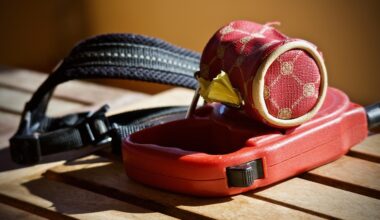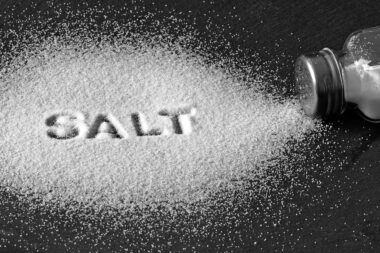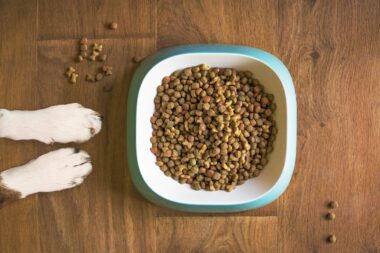Managing Canine Obesity for a Healthier Life
Managing canine obesity begins with understanding your dog’s ideal weight. Each breed has different standards, making it essential to consult your veterinarian for guidance. Regular weight checks help to monitor your dog’s progress in achieving a healthy weight. Keeping an eye on their body condition score (BCS) is vital, and your vet can assist you with this. Remember, a healthy dog’s ribs should be easy to feel but not visible. Senior dogs may have different needs, so tailor their diet accordingly. Understanding calorie intake is crucial; most adult dogs require between 20 to 40 calories per pound of body weight daily. Using measuring cups for dog food ensures accuracy. Avoid free feeding, as it can lead to weight gain. Instead, establish meal times, giving your dog a sense of routine. Incorporate treats, but be careful not to exceed 10% of their daily calorie intake with them. Always opt for healthy alternatives like carrots or apples. Provide plenty of fresh water during meal times, as hydration aids digestion, affecting overall health. If you’re unsure of portion sizes, ask your vet for personalized feeding recommendations based on your dog’s activity level.
Dogs, like humans, need a balanced diet to maintain a healthy weight. Adopting a high-quality dog food rich in nutrients is essential for the overall health of your dog. Be sure to check the ingredient list for high-quality protein sources. Foods high in fillers can contribute to obesity over time. Moreover, incorporating fiber into your dog’s diet can create a feeling of fullness with fewer calories. This can include veggies like green beans or pumpkin, which are low in calories and high in satisfaction. Regular exercise is an essential component of effective weight management. Many dogs benefit significantly from daily walks, playtime, and other forms of physical activity. Aim for at least 30 minutes of exercise a day, depending on your dog’s breed and age. Mixing routines can keep things interesting; for example, consider introducing agility or fetch games. Additionally, it’s also important to understand that some medical conditions can lead to weight gain, so a regular check-up is crucial. Consult your vet if you suspect underlying issues. Maintaining a consistent feeding schedule and exercise plan can lead to a healthier and happier dog.
Keeping Dogs Active
Keeping dogs active is key to combating obesity. Different activities can suit various breeds and energy levels. Fetch is a classic game that encourages both physical exertion and bonding time with you. Alternatively, consider games like hide and seek, where your dog finds you or their favorite toys; this stimulates their brains while getting them moving. Swimming is another fantastic opportunity for exercise; many dogs enjoy water, and swimming is low-impact, perfect for older or overweight dogs. If you have access to dog parks, they can provide a perfect environment for socializing and running freely. Socialization is vital, as it prevents behavioral issues associated with boredom or loneliness. Try to mix up activities to keep your dog engaged and excited. For instance, rotating toys can keep magic alive during playtime. Consider signing up for dog classes, which offer socialization and skill development while being active. Remember that a tired dog often equates to a happy dog. Regular exercise not only helps with weight but also prevents health issues, from joint problems to heart disease, ensuring your furry friend can enjoy their lives to the fullest.
Understand that weight management isn’t just about diet and exercise; your approach can significantly impact your dog’s health. Mindful eating means being aware of your dog’s food intake and how it aligns with their health goals. Incorporating interactive feeding toys can slow down fast eaters while making mealtime fun and engaging. Dogs that slow their eating typically have a more satiated feeling after meals. Training sessions can also double as exercise; rewarding positive behavior with healthy treats encourages good habits. Choose low-calorie or nutritious snacks when rewarding your dog. Consider investing in a kitchen scale for precise measurements of your dog’s food to avoid over-portioning consistently. Weight-related issues often arise from owners unintentionally feeding their dogs too much food or treats. Avoid using food as a reward for good behavior; instead, offer praise, pets, and playtime alongside fewer calorie treats. Make the feeding environment stress-free; a calm space assists with digestion and ensures that your dog enjoys meals without distractions. Keep in mind that human food should be strictly monitored; even small slips can result in unhealthy weight gain over time. Focus on healthy body weight through a consistent routine, foods, and options.
The Importance of Regular Vet Check-Ups
Regular vet check-ups are essential in managing canine obesity effectively. Routine visits allow your vet to assess your dog’s weight and overall health. These appointments often include body condition scoring to evaluate fat distribution and muscle mass. Moreover, your veterinarian can screen for health conditions contributing to weight gain, such as hypothyroidism or diabetes. Monthly weigh-ins at the vet’s office can help keep track of weight changes and determine whether your dog’s diet and exercise plan is effective. Professional recommendations geared toward your dog’s health enable better adjustments to food or activity levels. Treatment approaches may include prescribed weight-loss diets formulated for dogs struggling with obesity. These diets are often lower in calories but ensure essential nutrients are not compromised. Regular check-ups also help monitor your pet’s response to treatment, helping to modify plans if needed. In addition, many veterinary clinics offer weight management programs that allow tracking progress with professional guidance. Creating a weight loss plan tailored to your dog’s needs is beneficial for their long-term health. With the right support, owners can ensure their furry companions lead healthier lives and prevent complications associated with obesity.
Keeping track of your dog’s progress is a key component of effective weight management. Documenting your dog’s weight and habits helps identify trends and areas needing attention. A simple notebook or digital app can prove effective for logging information such as meals, treats, and exercise. Keeping this information readily available allows for better communication with your vet during consultations. Transforming your dog’s weight loss journey into a shared experience cultivates a sense of responsibility for their health. Tracking milestones, such as reaching an initial weight goal, can provide positive motivation for both you and your dog. Additionally, consider taking photographs of your dog at different stages, as visual progress can inspire continued efforts. Consistency in tracking weight and habits fosters accountability, making adjustments easier as needs change. Incorporating new routines provides an exciting atmosphere for both of you. Celebrate smaller victories and applaud the effort; every bit counts. Regularly celebrate successes through other means than food, such as extra playtime, toys, or fun outings. Remember, the ultimate goal is not just weight loss but optimizing their health, ensuring your dog will enjoy many more happy years by your side.
Conclusion and Maintaining a Healthy Lifestyle
In conclusion, maintaining a healthy lifestyle for your dog is entirely achievable with commitment and a positive approach. Prioritize a proper diet with enthusiastic engagement and regular exercise. Everything plays a role in guiding your dog toward a healthier weight. Once you identify your dog’s goals, continue to educate yourself on canine nutrition, weight management, and exercise. Community support is invaluable; consider joining local pet groups or online forums to share experiences with fellow dog owners who face similar challenges. As much as you prioritize your pet’s needs, remember that your mindset matters. Keeping a positive, encouraging attitude toward weight management efforts can prove beneficial for both you and your dog. After all, forming a companionship built on small changes makes for a healthier future together. Don’t forget to reward your dog’s effort during this journey, as it inspires ongoing participation and enthusiasm for their well-being. Assure your dog receives love and attention, independent of weight goals. Being a responsible dog owner means loving your dog unconditionally, regardless of their weight; however, a collaborative effort toward achieving a healthy lifestyle ensures longevity of love and companionship.
Managing canine obesity can promote a happier, healthier life for your furry friend. Incorporating a balanced approach that prioritizes nutrition, exercise, and routine vet visits is crucial for their overall well-being. Together, you and your dog can thrive!
